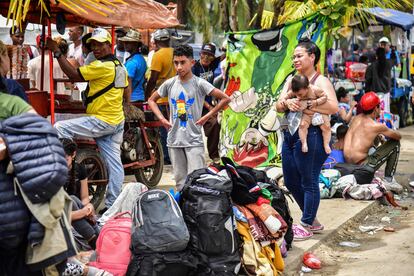Biden to offer 24,000 Venezuelan migrants a legal way into the US
Inspired by a program for Ukrainians, the plan will require a US-based sponsor for every applicant, while those who try to enter illegally will be sent back to Mexico


The US Department of Homeland Security (DHS) has reached an agreement with Mexico in a bid to reduce the number of immigrants arriving at the southwest border. The United States has pledged to “create a more orderly and safe process” for people fleeing the humanitarian and economic crisis in Venezuela through a humanitarian program that will be open to 24,000 applicants.
At the same time, Venezuelan nationals who attempt to enter the US illegally will be immediately returned to Mexico, instead of being released on American soil to face removal proceedings at a later date, as is currently often the case.
“Almost four times as many Venezuelans as last year attempted to cross our southern border, placing their lives in the hands of ruthless smuggling organizations. Meanwhile, irregular migration from northern Central America is down by a quarter from the level encountered last year,” said the DHS in a statement.
The economic, political and social crisis in Venezuela has caused millions of people to leave the country in recent years, in a desperate attempt to escape poverty and shortages in what was once the wealthiest country in South America.
US government sources explained in a call with journalists that the agreement aims to address the most acute irregular migration flows and help relieve pressure on the cities and states that are receiving these migrants.
It is a model similar to the one used to handle Ukrainian immigration to the US following the Russian invasion. For now, it only applies to Venezuelan immigrants, who represent the majority of new arrivals in recent months. It will not be necessary for migrants to travel directly from Venezuela to the United States – in fact, there are currently no flights between the two countries.
The campaign will include new immigration checkpoints, additional resources and personnel, joint pursuit of human smuggling organizations, and expanded sharing of information related to transit nodes, hotels, stash houses and staging locations.
The DHS said the humanitarian program will be open to up to 24,000 Venezuelans, but could be expanded in the future. However, “the United States will not implement this process without Mexico keeping in place its independent but parallel effort to accept the return of Venezuelan nationals who bypass this process and attempt to enter irregularly.”
The program will allow US residents to apply on behalf of a Venezuelan citizen to come to the country for a period of up to two years and receive work authorization, government officials explained. The government said it would provide more details in the coming days, but revealed it will be necessary for applicants to demonstrate that they can financially support the migrant for the duration of the stay.
Weaponizing immigration
Immigration has been used as a political weapon by Republican governors in states such as Texas and Florida who have sent buses and planes filled with immigrants to Democratic bastions including Washington DC, New York and Chicago. The limit of 24,000 migrants in the new program is much lower than the migratory flow that authorities are trying to control – more than 150,000 people in the last year.
In addition, the program could leave in a limbo those who have already made the journey from Venezuela but have not yet crossed the US border. Migrants now entering Mexico and Panama irregularly will not be able to participate in the legal process, according to US government officials, who said that they want to discourage dangerous crossings through places like the Darién jungle between Panama and Colombia.
Tu suscripción se está usando en otro dispositivo
¿Quieres añadir otro usuario a tu suscripción?
Si continúas leyendo en este dispositivo, no se podrá leer en el otro.
FlechaTu suscripción se está usando en otro dispositivo y solo puedes acceder a EL PAÍS desde un dispositivo a la vez.
Si quieres compartir tu cuenta, cambia tu suscripción a la modalidad Premium, así podrás añadir otro usuario. Cada uno accederá con su propia cuenta de email, lo que os permitirá personalizar vuestra experiencia en EL PAÍS.
¿Tienes una suscripción de empresa? Accede aquí para contratar más cuentas.
En el caso de no saber quién está usando tu cuenta, te recomendamos cambiar tu contraseña aquí.
Si decides continuar compartiendo tu cuenta, este mensaje se mostrará en tu dispositivo y en el de la otra persona que está usando tu cuenta de forma indefinida, afectando a tu experiencia de lectura. Puedes consultar aquí los términos y condiciones de la suscripción digital.








































